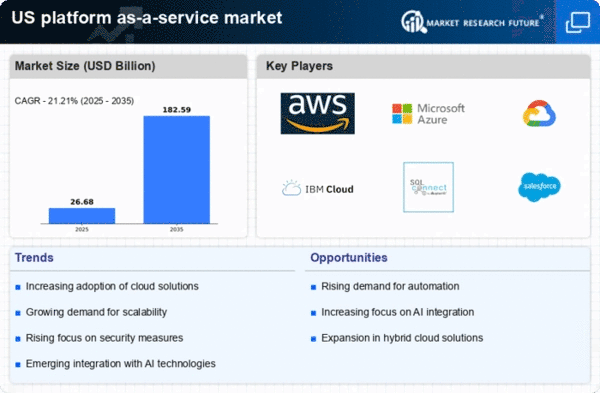Shift Towards Cost Efficiency
Cost efficiency remains a pivotal driver in the platform as-a-service market. Organizations are continuously looking for ways to optimize their IT expenditures while maintaining high performance. PaaS solutions offer a compelling value proposition by reducing the need for extensive hardware investments and minimizing operational costs. Recent statistics indicate that businesses can save up to 30% on IT costs by migrating to PaaS. This shift towards cost efficiency is compelling many companies to adopt platform as-a-service solutions, thereby accelerating growth in the market.
Growing Demand for Scalability
The platform as-a-service market is experiencing a notable surge in demand for scalability solutions. Businesses are increasingly seeking flexible platforms that can adapt to their evolving needs. This trend is driven by the necessity for organizations to scale operations efficiently without incurring substantial costs. According to recent data, the scalability feature is a primary consideration for approximately 70% of enterprises when selecting a PaaS provider. This growing demand for scalability is reshaping the platform as-a-service market, as providers enhance their offerings to accommodate varying workloads and user requirements.
Emphasis on Data Analytics and Insights
The emphasis on data analytics and insights is significantly influencing the platform as-a-service market. Organizations are increasingly leveraging data to drive decision-making and improve operational efficiency. PaaS solutions that incorporate advanced analytics tools enable businesses to extract valuable insights from their data. Recent findings suggest that approximately 75% of companies consider data analytics a crucial factor in their PaaS selection process. This emphasis on data-driven decision-making is likely to propel the platform as-a-service market, as more organizations seek to harness the power of analytics.
Rising Need for Integration Capabilities
The platform as-a-service market is witnessing a rising need for robust integration capabilities. As businesses increasingly adopt multiple cloud services, the ability to seamlessly integrate various applications becomes paramount. PaaS solutions that offer comprehensive integration tools are becoming essential for organizations aiming to create cohesive ecosystems. Data indicates that around 60% of enterprises prioritize integration features when selecting a PaaS provider. This rising need for integration capabilities is driving innovation within the platform as-a-service market, as providers enhance their offerings to meet these demands.
Increased Focus on Developer Productivity
Enhancing developer productivity is a critical driver in the platform as-a-service market. Organizations are recognizing the importance of streamlining development processes to accelerate time-to-market for applications. PaaS platforms provide tools and services that facilitate rapid application development, enabling developers to focus on coding rather than infrastructure management. Recent surveys suggest that 65% of developers prefer PaaS solutions for their ability to enhance productivity. This focus on developer efficiency is likely to propel the platform as-a-service market forward as more companies seek to leverage these advantages.

















